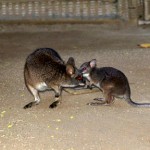Clik here to view.

Clik here to view.

Clik here to view.

Tinka bonds with an adult female parma wallaby.
New Year 2012 brought big, bold changes for our little parma wallaby, Tinka. She made the transition from living in the nursery to staying in the main Zoo with no problems. Now it was time for us to finish preparing Tinka for life with the adult parma wallabys. First, we paired Tinka with a female we call #104. Starting with just one gentle animal was a good way to ease Tinka into a larger social setting. This furry and friendly adult was a good match. We were pleased when the two seemed to bond right away, so we let the pair spend 24 hours a day together.
Next, it was necessary to make several adjustments to Tinka’s diet. On January 11, Tinka received her last bottle feeding; now she would have to rely solely on solid food. Often, when we are transitioning an animal from a liquid diet of formula to solid food we offer various temporary, transitional diet items just like you would a human toddler. Transitional foods help the animal accept solids more readily, and for Tinka these included fresh, leafy greens like lettuce, kale, and spinach along with browse and herbivore pellets soaked in water. Next, we had to gradually delete treats and offer Tinka only the adult diet: dry pellets. True to form, Tinka adjusted without incident. Her weight continued upward as she consumed her new, abbreviated menu.
Our final step—this was the big one—was to permanently wean Tinka of access to her beloved and comfy artificial pouch. There was no doubt that Tinka was ready for this step; judging by her size, there was simply no way she would fit into a female’s pouch, as her weight had climbed to 3.5 pounds (1.5 kilograms)! Still, life without the pouch she grew up in would clearly represent a big change.
Tinka spent her first night without an artificial pouch on January 28. We stationed a heater, called a pig blanket, under a cozy shelter in the pen to keep her warm. Pig blankets are special heated mats used for livestock. Electric coils inside the sturdy, plastic mat keep the substrate warm. We placed one of her familiar blankets nearby on the first night for added comfort. Once again, Tinka did not disappoint us and quickly adjusted beautifully.
Tinka, now a soft, fuzzy, and friendly wallaby, was ready for her final graduation: living with the rest of the “ladies” in the wallaby group. By this time, construction on the Zoo’s new Australian Outback area had begun in earnest. The old enclosures were being removed to make way for beautiful new ones. There was to be lots of noise, dust, and commotion, three things that the shy wallabies don’t appreciate. Therefore, the wallaby group was moved to a temporary pen to make them more comfortable during construction. Tinka joined them on the morning of February 1, 2012.
We packed Tinka into a transfer crate and drove her over to the new quarters. Her companion, #104, was crated, and keepers followed close behind. The new area consists of a large, flat outdoor pen with an attached, covered barn structure. Keeper Joann Haddad moved the parma group outside into the pen and closed the barn door in preparation for Tinka’s arrival. When we arrived, the barn was clean and empty for Tinka to explore alone. I sat with her inside the barn to get her settled as the adults waited on the other side of the barn door in the sunny yard. Tinka came out of the crate calmly and sniffed around. She was alert and curious about the new digs. After a few minutes, we placed #104 in the barn area with us. Things were going well, so we continued the introduction. Keeper Joann slowly slid the barn door open. Light streamed across the floor as Tinka hopped from the shade into the sunshine outside. Female #104 stayed close to Tinka as the others stopped by to check Tinka out.
We are proud that Tinka took this last step with as much courage as she had all the previous ones. That small, hairless, and fragile joey that depended on our very best care is now grown up. Our time with Tinka has ended, but her adventures are just beginning. Thank you, Tinka. It’s been a real pleasure, and we wish you well.
Janet Hawes is a lead keeper at the San Diego Zoo.